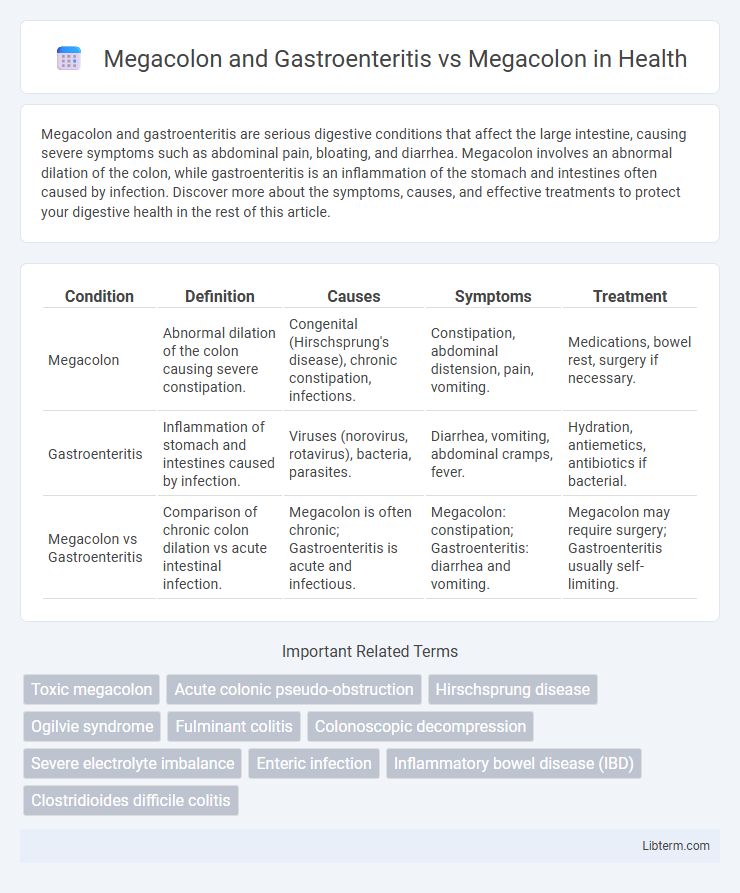Megacolon and gastroenteritis are serious digestive conditions that affect the large intestine, causing severe symptoms such as abdominal pain, bloating, and diarrhea. Megacolon involves an abnormal dilation of the colon, while gastroenteritis is an inflammation of the stomach and intestines often caused by infection. Discover more about the symptoms, causes, and effective treatments to protect your digestive health in the rest of this article.
Table of Comparison
| Condition | Definition | Causes | Symptoms | Treatment |
|---|---|---|---|---|
| Megacolon | Abnormal dilation of the colon causing severe constipation. | Congenital (Hirschsprung's disease), chronic constipation, infections. | Constipation, abdominal distension, pain, vomiting. | Medications, bowel rest, surgery if necessary. |
| Gastroenteritis | Inflammation of stomach and intestines caused by infection. | Viruses (norovirus, rotavirus), bacteria, parasites. | Diarrhea, vomiting, abdominal cramps, fever. | Hydration, antiemetics, antibiotics if bacterial. |
| Megacolon vs Gastroenteritis | Comparison of chronic colon dilation vs acute intestinal infection. | Megacolon is often chronic; Gastroenteritis is acute and infectious. | Megacolon: constipation; Gastroenteritis: diarrhea and vomiting. | Megacolon may require surgery; Gastroenteritis usually self-limiting. |
Understanding Megacolon: Definition and Types
Megacolon is an abnormal dilation of the colon that can be congenital, acquired, or idiopathic, often causing severe constipation and abdominal distention. Gastroenteritis, characterized by inflammation of the gastrointestinal tract due to infection, typically does not cause megacolon but can lead to toxic megacolon in severe cases. Understanding the specific type of megacolon, such as Hirschsprung's disease (congenital) or toxic megacolon (acquired), is crucial for accurate diagnosis and appropriate treatment.
Overview of Gastroenteritis: Causes and Symptoms
Gastroenteritis primarily results from infections caused by viruses, bacteria, or parasites, leading to inflammation of the stomach and intestines. Key symptoms include diarrhea, vomiting, abdominal pain, fever, and dehydration. Unlike megacolon, which involves abnormal dilation of the colon often due to neurological or muscular dysfunction, gastroenteritis is an acute condition focused on intestinal infection and inflammation.
Megacolon: Pathophysiology and Progression
Megacolon is characterized by abnormal dilation of the colon, resulting from impaired motility due to nerve or muscle dysfunction. Its pathophysiology often involves damage to the enteric nervous system, leading to chronic stool retention and progressive colon enlargement. Unlike gastroenteritis, which is an acute inflammatory condition of the gastrointestinal tract, megacolon progresses slowly and can cause severe complications such as bowel obstruction or perforation if untreated.
Key Differences Between Megacolon and Gastroenteritis
Megacolon is a chronic condition characterized by abnormal dilation of the colon often due to nerve dysfunction, whereas gastroenteritis is an acute inflammation of the gastrointestinal tract typically caused by infection. Megacolon leads to severe constipation, abdominal pain, and potentially life-threatening complications like perforation, unlike gastroenteritis which primarily causes diarrhea, vomiting, and dehydration. Diagnostic approaches for megacolon include abdominal X-rays and colonoscopy, while gastroenteritis is usually identified through stool analysis and clinical symptoms.
Risk Factors: Who is Susceptible to Megacolon vs Gastroenteritis?
Megacolon primarily affects individuals with chronic conditions such as Hirschsprung's disease, Chagas disease, or severe constipation, typically seen in congenital or neurological disorders. Gastroenteritis, often caused by viral or bacterial infections, poses a higher risk to young children, elderly adults, and immunocompromised individuals due to their weaker immune defenses. Understanding these distinct risk factors is essential for accurate diagnosis and tailored treatment strategies.
Clinical Presentations: Comparing Symptoms of Megacolon and Gastroenteritis
Megacolon typically presents with symptoms such as abdominal distension, severe constipation, and colonic dilation, often accompanied by abdominal pain and bloating. Gastroenteritis manifests primarily with diarrhea, vomiting, abdominal cramps, and fever, reflecting its infectious or inflammatory etiology. Unlike gastroenteritis, megacolon does not usually cause acute diarrhea but may lead to chronic bowel obstruction symptoms and risks of perforation or toxic megacolon.
Diagnostic Approaches: Imaging and Laboratory Tests
Megacolon diagnosis relies heavily on imaging techniques such as abdominal X-rays and CT scans to identify significant colonic dilation and rule out obstruction, while laboratory tests focus on electrolyte imbalances and inflammatory markers to assess underlying causes. In contrast, gastroenteritis diagnosis is primarily clinical but complemented by stool cultures, PCR assays, and blood tests to detect infectious agents and systemic inflammation. Differentiating between megacolon and gastroenteritis through targeted imaging and lab evaluations is crucial for appropriate management and preventing complications like toxic megacolon.
Treatment Strategies for Megacolon and Gastroenteritis
Treatment strategies for megacolon focus on relieving colonic distention and restoring normal bowel function, often involving bowel decompression, laxatives, and in severe cases, surgical intervention like colectomy. Gastroenteritis treatment emphasizes rehydration, electrolyte balance restoration, and symptomatic relief using antidiarrheals and antiemetics, while antibiotics are reserved for specific bacterial infections. Managing megacolon with concurrent gastroenteritis requires integrated approaches to address both underlying colonic dysfunction and acute infectious symptoms to prevent complications such as bowel perforation or toxic megacolon.
Complications Associated with Megacolon and Gastroenteritis
Complications associated with megacolon and gastroenteritis include severe dehydration, electrolyte imbalances, and potential progression to toxic megacolon or bowel perforation, both of which require urgent medical intervention. Gastroenteritis can exacerbate megacolon by increasing inflammation and fluid loss, heightening the risk of systemic infection and sepsis. Prompt diagnosis and management are crucial to prevent life-threatening outcomes such as septic shock and multiorgan failure.
Prevention, Prognosis, and Patient Outcomes
Preventing megacolon involves early detection and management of underlying causes such as chronic constipation or Hirschsprung's disease, while gastroenteritis prevention centers on hygiene and avoiding contaminated food or water. The prognosis of megacolon varies by type, with toxic megacolon posing significant risks requiring prompt treatment, whereas gastroenteritis usually resolves without major complications but can lead to dehydration if untreated. Patient outcomes improve with timely intervention: megacolon may need surgical correction to prevent severe complications, whereas gastroenteritis outcomes depend largely on rehydration and supportive care.
Megacolon and Gastroenteritis Infographic

 libterm.com
libterm.com